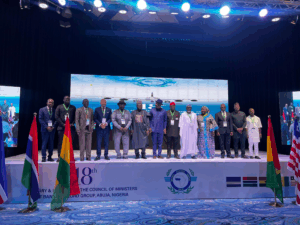
… amidst the new demands for institutional reform
West African aviation authorities are taking steps to institutionalize a permanent regional aviation monitoring body as the Banjul Accord Group (bag) met in Abuja, Nigeria for the group's 18th overall session.
In his keynote address, Festus Keehmo, Nigerian Minister of Aviation and Aerospace, made public the conference and declared a solid call for the bag to evolve into a fully structured, permanent entity with autonomous operations.
He emphasized that this transformation is essential to maintaining the long-standing benefits of aviation safety and efficiency by member states.
“We must convert the bag into a permanent, fully structured entity that can maintain its impact and expand,” Keeamo urged representatives to help them with the shift. The minister added that institutionalization provides a stronger governance framework and the resources needed for long-term success.
Banjuru Accord Group, a West African provincial partnership aimed at strengthening aviation safety and regulatory oversight, has made great strides through related institutions, including the Bag Air Safety Monitoring Agency (Bagasse Soo) based in Abuja and the Bag Accident Investigation Agency (Bagasse Soo) in Praia, Cape Verde.
These agencies serve as the technical backbone for improving airworthiness and accident investigation protocols across the region.
Keeamo praised the role of these agencies in aligning regional aviation standards with international benchmarks.
He said that regional cooperation allowed West African countries to surpass the global aviation weight despite limited financial resources. However, he warned that further progress will depend on deeper commitments and stronger institutional frameworks.
The representative also focused on the Single African Air Transport Market (SAATM), the African Union's flagship initiative aimed at liberalizing in-African aviation services.
Keeamo called SAATM “a bold and visionary step” to unlock the potential of aviation on the continent. However, he noted that fragmented regulations and fragmentation of intra-African airfares have slowed implementation.
“Our sky must be defined by open opportunities rather than closed boundaries,” he said, urging member states to take concrete action beyond political declarations.
Hwang Bojang, head of the Bag Office, reflected the minister's sentiment and highlighted both the group's achievements and looming challenges.
He noted that while the bag has accomplished a lot, establishing safety monitoring and accident investigation agencies recognized by other ICAO regions remains uncertain unless structural and funding issues are resolved.

“Our existence is threatened by serious political challenges,” Bojang said, pointing to the need for a sustainable fundraising mechanism. Currently, the special subcommittee is considering options for long-term financing of the group's operations.
He also appealed to include more service providers, such as airlines and airport operators, within Bag membership. “Service providers have to put their rightful spots in their bags,” he said.


